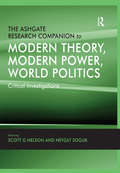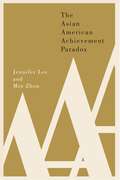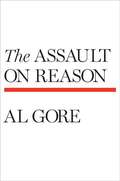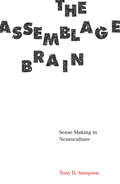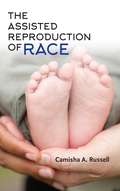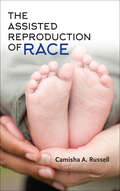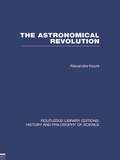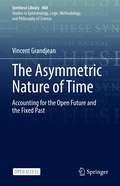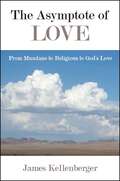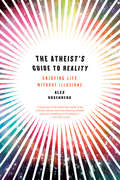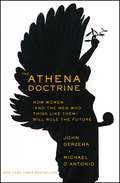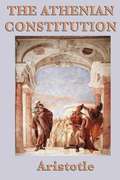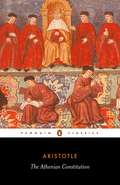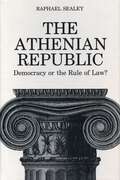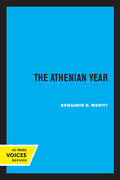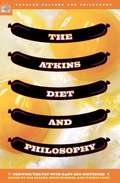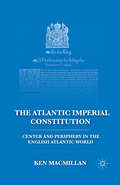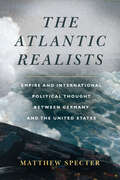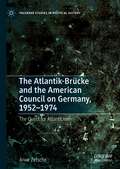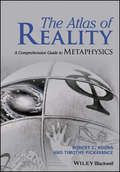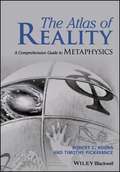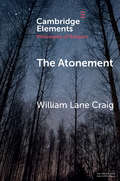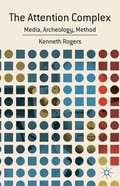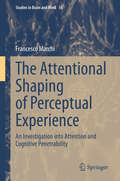- Table View
- List View
The Ashgate Research Companion to Modern Theory, Modern Power, World Politics: Critical Investigations
by Nevzat Soguk Scott G NelsonDeliberately eschewing disciplinary and temporal boundaries, this volume makes a major contribution to the de-traditionalization of political thinking within the discourses of international relations. Collecting the works of twenty-five theorists, this Ashgate Research Companion engages some of the most pressing aspects of political thinking in world politics today. The authors explore theoretical constitutions, critiques, and affirmations of uniquely modern forms of power, past and present. Among the themes and dynamics examined are textual appropriation and representation, materiality and capital formation, geopolitical dimensions of ecological crises, connections between representations of violence and securitization, subjectivity and genderization, counter-globalization politics, constructivism, biopolitics, post-colonial politics and theory, as well as the political prospects of emerging civic and cosmopolitan orders in a time of national, religious, and secular polarization. Radically different in their approaches, the authors critically assess the discourses of IR as interpretive frames that are indebted to the historical formation of concepts, and to particular negotiations of power that inform the main methodological practices usually granted primacy in the field. Students as well as seasoned scholars seeking to challenge accepted theoretical frameworks will find in these chapters fresh insights into contemporary world-political problems and new resources for their critical interrogation.
The Asian American Achievement Paradox
by Jennifer Lee Min ZhouAsian Americans are often stereotyped as the “model minority.” Their sizeable presence at elite universities and high household incomes have helped construct the narrative of Asian American “exceptionalism.” While many scholars and activists characterize this as a myth, pundits claim that Asian Americans’ educational attainment is the result of unique cultural values. In The Asian American Achievement Paradox, sociologists Jennifer Lee and Min Zhou offer a compelling account of the academic achievement of the children of Asian immigrants. Drawing on in-depth interviews with the adult children of Chinese immigrants and Vietnamese refugees and survey data, Lee and Zhou bridge sociology and social psychology to explain how immigration laws, institutions, and culture interact to foster high achievement among certain Asian American groups. For the Chinese and Vietnamese in Los Angeles, Lee and Zhou find that the educational attainment of the second generation is strikingly similar, despite the vastly different socioeconomic profiles of their immigrant parents. Because immigration policies after 1965 favor individuals with higher levels of education and professional skills, many Asian immigrants are highly educated when they arrive in the United States. They bring a specific “success frame,” which is strictly defined as earning a degree from an elite university and working in a high-status field. This success frame is reinforced in many local Asian communities, which make resources such as college preparation courses and tutoring available to group members, including their low-income members. While the success frame accounts for part of Asian Americans’ high rates of achievement, Lee and Zhou also find that institutions, such as public schools, are crucial in supporting the cycle of Asian American achievement. Teachers and guidance counselors, for example, who presume that Asian American students are smart, disciplined, and studious, provide them with extra help and steer them toward competitive academic programs. These institutional advantages, in turn, lead to better academic performance and outcomes among Asian American students. Yet the expectations of high achievement come with a cost: the notion of Asian American success creates an “achievement paradox” in which Asian Americans who do not fit the success frame feel like failures or racial outliers. While pundits ascribe Asian American success to the assumed superior traits intrinsic to Asian culture, Lee and Zhou show how historical, cultural, and institutional elements work together to confer advantages to specific populations. An insightful counter to notions of culture based on stereotypes, The Asian American Achievement Paradox offers a deft and nuanced understanding how and why certain immigrant groups succeed.
The Assault on Reason: How the Politics of Blind Faith Subvert Wise Decision-making
by Al GoreA visionary analysis of how the politics of fear, secrecy, cronyism, and blind faith have combined with the degradation of the public sphere to create an environment hostile to reason
The Assemblage Brain: Sense Making in Neuroculture
by Tony D. SampsonOnce upon a time, neuroscience was born. A dazzling array of neurotechnologies emerged that, according to popular belief, have finally begun to unlock the secrets of the brain. But as the brain sciences now extend into all corners of cultural, social, political, and economic life, a yet newer world has taken shape: &“neuroculture,&” which goes further than ever before to tackle the profound ethical implications we face in consequence.The Assemblage Brain unveils a major new concept of sense making, one that challenges conventional scientific and philosophical understandings of the brain. Drawing on Deleuze and Guattari, Tony D. Sampson calls for a radical critical theory that operates in the interferences between philosophy, science, art, and politics. From this novel perspective the book is structured around two questions: &“What can be done to a brain?&” and &“What can a brain do?&” Sampson examines the rise of neuroeconomics in informing significant developments in computer work, marketing, and the neuropharmaceutical control of inattentiveness in the classroom. Moving beyond the neurocapitalist framework, he then reestablishes a place for proto-subjectivity in which biological and cultural distinctions are reintegrated in an understanding of the brain as an assemblage. The Assemblage Brain unravels the conventional image of thought that underpins many scientific and philosophical accounts of how sense is produced, providing a new view of our current time in which capitalism and the neurosciences endeavor to colonize the brain.
The Assisted Reproduction of Race
by Camisha A. RussellThe use of assisted reproductive technologies (ART)--in vitro fertilization, artificial insemination, and gestational surrogacy--challenges contemporary notions of what it means to be parents or families. Camisha A. Russell argues that these technologies also bring new insight to ideas and questions surrounding race. In her view, if we think of ART as medical technology, we might be surprised by the importance that people using them put on race, especially given the scientific evidence that race lacks a genetic basis. However if we think of ART as an intervention to make babies and parents, as technologies of kinship, the importance placed on race may not be so surprising after all. Thinking about race in terms of technology brings together the common academic insight that race is a social construction with the equally important insight that race is a political tool which has been and continues to be used in different contexts for a variety of ends, including social cohesion, economic exploitation, and political mastery. As Russell explores ideas about race through their role in ART, she brings together social and political views to shift debates from what race is to what race does, how it is used, and what effects it has had in the world.
The Assisted Reproduction of Race
by Camisha A. RussellA philosopher examines the social implications of assisted reproductive technologies at the intersection of race, medicine, and bioethics.The use of assisted reproductive technologies (ART)—in vitro fertilization, artificial insemination, and gestational surrogacy—challenges contemporary notions of what it means to be parents or families. Camisha A. Russell argues that these technologies also bring new insight to ideas and questions surrounding race. She does this in part by reframing ART, as medical technologies that also act as technologies of kinship.Thinking about race in terms of technology brings together the common academic insight that race is a social construction with the equally important insight that race is a political tool used in different contexts for a variety of ends. As Russell explores ideas about race through their role in ART, she brings together social and political views to shift debates from what race is to what race does, how it is used, and what effects it has had in the world.
The Astronomical Revolution: Copernicus - Kepler - Borelli (Routledge Library Editions: History & Philosophy of Science)
by Alexandre KoyreOriginally published in English in 1973. This volume traces the development of the revolution which so drastically altered man’s view of the universe in the sixteenth and seventeenth centuries. The "astronomical revolution" was accomplished in three stages, each linked with the work of one man. With Copernicus, the sun became the centre of the universe. With Kepler, celestial dynamics replaced the kinematics of circles and spheres used by Copernicus. With Borelli the unification of celestial and terrestrial physics was completed by abandonment of the circle in favour the straight line to infinity.
The Asymmetric Nature of Time: Accounting for the Open Future and the Fixed Past (Synthese Library #468)
by Vincent GrandjeanThis open access monograph offers a detailed study and a systematic defense of a key intuition we typically have, as human beings, with respect to the nature of time: the intuition that the future is open, whereas the past is fixed. For example, whereas it seems unsettled whether there will be a fourth world war, it is settled that there was a first world war.The book contributes, in particular, three major and original insights. First, it provides a coherent, non-metaphorical, and metaphysically illuminating elucidation of the intuition. Second, it determines which model of the temporal structure of the world is most appropriate to accommodate the intuition, and settles on a specific version of the Growing Block Theory of time (GBT). Third, it puts forward a naturalistic foundation for GBT, by exploiting recent results of our best physics (viz. General Relativity, Quantum Mechanics, and Quantum Gravity). Three main challenges are addressed: the dismissal of temporal asymmetries as non-fundamental phenomena only (e.g., thermodynamic or causal phenomena), the epistemic objection against GBT, and the apparent tension between GBT and relativistic physics. It is argued that the asymmetry between the open future and the fixed past must be grounded in the temporal structure of the world, and that this is neither precluded by our epistemic device, nor by the latest approaches to Quantum Gravity (e.g., the Causal Set Theory). Aiming at reconciling time as we find it in ordinary experience and time as physics describes it, this innovative book will raise the interest of both academic researchers and graduate students working on the philosophy of time. More generally, it presents contents of interest for all metaphysicians and non-dogmatic philosophers of physics.This is an open access book.
The Asymptote of Love: From Mundane to Religious to God's Love
by James KellenbergerIn The Asymptote of Love, James Kellenberger develops a theory of religious love that resists essentialist definitions of the term and brings into conversation historical debates on love in Western philosophy and Christian theology. He argues that if love can be likened to a mathematical asymptote, which is a straight line that infinitely approaches a curve but never quite reaches it, then the asymptote of love reaches toward the infinite endpoint of love at its uttermost, namely, God's love. Drawing upon a broad range of thinkers who have put forth classic debates on love—such as St. Augustine of Hippo, Anders Nygren, and St. Thomas Aquinas, as well as some lesser known figures in the debate, such as Leo Tolstoy and Albert Schweitzer—Kellenberger explains the profound connection between human agape and God's infinite love in its capacity to offer both directive guidance and to exist beyond human conception.
The Atheist's Guide to Reality: Enjoying Life without Illusions
by Alex RosenbergA book for nonbelievers who embrace the reality-driven life. We can't avoid the persistent questions about the meaning of life-and the nature of reality. Philosopher Alex Rosenberg maintains that science is the only thing that can really answer them--all of them. His bracing and ultimately upbeat book takes physics seriously as the complete description of reality and accepts all its consequences. He shows how physics makes Darwinian natural selection the only way life can emerge, and how that deprives nature of purpose, and human action of meaning, while it exposes conscious illusions such as free will and the self. The science that makes us nonbelievers provides the insight into the real difference between right and wrong, the nature of the mind, even the direction of human history. The Atheist's Guide to Reality draws powerful implications for the ethical and political issues that roil contemporary life. The result is nice nihilism, a surprisingly sanguine perspective atheists can happily embrace.
The Athena Doctrine: How Women (and the Men who Think Like Them) will Rule the Future
by Michael D’antonio John GerzemaBrought to life through real world examples and backed by rigorous data, The Athena Doctrine shows how feminine traits are ascending--and bringing success to people and organizations around the world.
The Athenian Constitution
by AristotleAncient accounts of Aristotle credit him with 170 Constitutions of various states; it is widely assumed that these were research for the Politics, and that many of them were written or drafted by his students. Athens, however, was a particularly important state, and where Aristotle was living at the time; it is plausible that, even if students did the others, Aristotle did that one himself, and possible that it was intended as a model for the rest. However, a number of prominent scholars doubt that it was written by Aristotle. If it is a genuine writing of Aristotle, then it is of particular significance because it is the only one of his extant writings that was actually intended for publication. Because it purports to supply us with so much contemporary information previously unknown or unreliable, modern historians have claimed that "the discovery of this treatise constitutes almost a new epoch in Greek historical study."
The Athenian Constitution
by AristotleProbably written by a student of Aristotle, The Athenian Constitution is both a history and an analysis of Athens' political machinery between the seventh and fourth centuries BC, which stands as a model of democracy at a time when city-states lived under differing kinds of government. The writer recounts the major reforms of Solon, the rule of the tyrant Pisistratus and his sons, the emergence of the democracy in which power was shared by all free male citizens, and the leadership of Pericles and the demagogues who followed him. He goes on to examine the city's administration in his own time - the council, the officials and the judicial system. For its information on Athens' development and how the democracy worked, The Athenian Constitution is an invaluable source of knowledge about the Athenian city-state.
The Athenian Republic: Democracy of the Rule of Law?
by Raphael SealeyThis book traces continuity in the development of the Athenian constitution, whereas previous studies have usually looked for catastrophic changes. Sealey selects three features of Athenian law which are important for the structure of society and the location of authority: (1) the legal status, and to a lesser extent the socioeconomic condition, of the different kinds of inhabitants of Attica; (2) the distinction, recognized in the fourth century, between "laws" and "decrees," analyzing what the Athians understood by "law"; and (3) the development of the Athenian courts.At an early stage the Athenians conceived the ideal of the rule of law and adhered to it continuously. They did so by means of a static concept of law and maintenance of an independent judiciary.The book is designed to be of importance not only for specialists in classical studies but for general historians, political scientists, and those concerned with the history of law. The book is within the reach of an advanced undergraduate and graduate audience.
The Athenian Year
by Benjamin D. MerittThis title is part of UC Press's Voices Revived program, which commemorates University of California Press’s mission to seek out and cultivate the brightest minds and give them voice, reach, and impact. Drawing on a backlist dating to 1893, Voices Revived makes high-quality, peer-reviewed scholarship accessible once again using print-on-demand technology. This title was originally published in 1961.
The Atkins Diet and Philosophy
by William Irwin Cynthia Pineo Kerri Mommer Lisa HeldkeThe Atkins diet has transformed the lives of millions of people, revolutionizing grocery store shelves, restaurant menus, and dinner-table conversations. But there are questions beyond its efficacy and longevity. Is the Atkins diet a new wrinkle in capitalist exploitation or a twisted expression of negative body images? Is it a symbol of super-masculinity? Has the Atkins diet really been around for centuries under other names? Can it increase intelligence, or cause global warming and melt the polar ice caps? How does Atkins fit into Kant's conception of the moral life, or Rousseau's vision of a kinder, gentler human society? The Atkins Diet and Philosophy wittily explores these and other pressing questions in sixteen entertaining essays. Following the same fun, readable approach as earlier volumes in this series, this book uses philosophy to put the Atkins diet under the microscope, and uses the Atkins diet to teach vital philosophical lessons for life.
The Atlantic Imperial Constitution
by Ken MacmillanDrawing on recent trends in both Atlantic and center-periphery literature, this book examines the relationship between the English crown - monarch, privy council, and ancillary bodies - and its Atlantic colonies under the early Stuart monarchs, James I and Charles I, circa 1603-1642.
The Atlantic Realists: Empire and International Political Thought Between Germany and the United States
by Matthew SpecterIn The Atlantic Realists, intellectual historian Matthew Specter offers a boldly revisionist interpretation of "realism," a prevalent stance in post-WWII US foreign policy and public discourse and the dominant international relations theory during the Cold War. Challenging the common view of realism as a set of universally binding truths about international affairs, Specter argues that its major features emerged from a century-long dialogue between American and German intellectuals beginning in the late nineteenth century. Specter uncovers an "Atlantic realist" tradition of reflection on the prerogatives of empire and the nature of power politics conditioned by fin de siècle imperial competition, two world wars, the Holocaust, and the Cold War. Focusing on key figures in the evolution of realist thought, including Carl Schmitt, Hans Morgenthau, and Wilhelm Grewe, this book traces the development of the realist worldview over a century, dismantling myths about the national interest, Realpolitik, and the "art" of statesmanship.
The Atlantik-Brücke and the American Council on Germany, 1952–1974: The Quest for Atlanticism (Palgrave Studies in Political History)
by Anne Zetsche"“Based on impressive multi-archival work and a keen sense for a good narrative, the author introduces us to the complex, interlocking networks of the littleknown Atlantik-Brücke and the American Council on Germany. A fantastic addition to our understanding of the ‘Transnational Transatlantic’ in the 20th century”- Giles Scott-Smith, Roosevelt Chair in New Diplomatic History, Leiden University, The Netherlands"An original and insightful book exploring how two transatlantic networks worked to improve and solidify West Germany’s relationship with the United States in the aftermath of World War II- transnational history at its best.”- Deborah Barton, Assistant Professor of History, University of Montreal, Canada Revisiting the relationship between the USA and Germany following the Second World War, this book offers a new perspective and focuses on the influence of two organisations in accelerating West Germany’s integration into the Atlantic Alliance. Tracing the Atlantik-Brücke and the American Council on Germany’s (ACG) origins to the late 1940s and tracking their development and activities throughout the 1950s-70s, this book covers new ground in German-American historiography by bridging public and private relations and introducing central actors that have previously been hidden from academic debate. The author unveils and examines dense transatlantic elite networks that allowed Germany to re-join the ‘community of nations,’ regain sovereignty, and become a trusted member of the North Atlantic Treaty Organisation (NATO). Analysing transatlantic relations through the lens of the intertwined history of the Atlantik-Brücke and the ACG, this book explores public-private networks on a transnational level, providing valuable reading for those studying political history, European and American post-war relations and the Cold War.
The Atlas of Reality: A Comprehensive Guide to Metaphysics
by Robert C. Koons Timothy PickavanceThe Atlas of Reality: A Comprehensive Guide to Metaphysics presents an extensive examination of the key topics, concepts, and guiding principles of metaphysics. Represents the most comprehensive guide to metaphysics available today Offers authoritative coverage of the full range of topics that comprise the field of metaphysics in an accessible manner while considering competing views Explores key concepts such as space, time, powers, universals, and composition with clarity and depth Articulates coherent packages of metaphysical theses that include neo-Aristotelian, Quinean, Armstrongian, and neo-Humean Carefully tracks the use of common assumptions and methodological principles in metaphysics
The Atlas of Reality: A Comprehensive Guide to Metaphysics
by Robert C. Koons; Timothy H. PickavanceRepresents the most comprehensive guide to metaphysics available today. Offers authoritative coverage of the full range of topics that comprise the field of metaphysics in an accessible manner while considering competing views. Explores key concepts such as space, time, powers, universals, and composition with clarity and depth. Articulates coherent packages of metaphysical theses that include neo-Aristotelian, Quinean, Armstrongian, and neo-Humean. Carefully tracks the use of common assumptions and methodological principles in metaphysics.
The Atonement (Elements in the Philosophy of Religion)
by William Lane CraigHow did Christ's death overcome the estrangement and condemnation of sinners before a holy God, so as to reconcile them to Him? A great variety of theories of the atonement have been offered over the centuries to make sense of the fact that Christ by his death has provided the means of reconciliation with God: ransom theories, satisfaction theories, moral influence theories, penal substitution theories, and so on. Competing theories need to be assessed by (i) their accord with biblical data and (ii) their philosophical coherence.
The Attending Mind
by Carolyn Dicey JenningsAn ancient metaphor likens attention to an archer pulling her bow - the self directing her mind through attention. Yet both the existence of such a self, and the impact of attention on the mind, have been debated for millennia. Advancements in science mean that we now have a better understanding of what attention is and how it works, but philosophers and scientists remain divided as to its impact on the mind. This book takes a strong stance: attention is the key to the self, consciousness, perception, action, and knowledge. While it claims that we cannot perceive novel stimuli without attention, it argues that we can act on and experience the world without attention. It thus provides a new way of thinking about the mind - as something that can either shape itself through attention or engage with the world as it is given, relying on its habits and skills.
The Attention Complex
by Kenneth RogersOver the past two decades in the United States, a profound reorientation of human attention has taken shape. This book addresses the recent cultural anxiety about attention as a way of negotiating a crisis of the self that is increasingly managed, mediated, and controlled by technologies.
The Attentional Shaping of Perceptual Experience: An Investigation into Attention and Cognitive Penetrability (Studies in Brain and Mind #16)
by Francesco MarchiThis monograph presents a clear account of when and how attentional processes can shape perceptual experience. This argument is based on the prediction-error minimization model of the mind. The author believes that the topic of attention should take a more central role in the debate about the influence of cognition on perception. Inside, he shows how this can be possible.The hypothesis that cognition may shape perceptual experience has been traditionally labeled as the cognitive penetrability of perceptual experience. Cognitive penetrability is relevant for several debates in philosophy and cognitive science. It tackles the possibility of gathering genuine knowledge on the basis of perceptual information about the world delivered by sensory channels. The problem, the author notes, is that if our previously acquired belief can shape current perceptual experiences, such experiences cannot serve as an adequate source of justification in retaining those beliefs or even forming new ones. He argues that cognitive penetration may sometimes happen through attentional processes, but that its occurrence need not undermine perceptual justification.The book provides an overview of the cognitive penetrability debate. The author discusses evidence that supports the occurrence of this phenomenon. Overall, this investigation offers readers a philosophical discussion of attention based on the biased-competition theory. It argues that attention is a property of mental representations that emerges from a metacognitive competition process.
